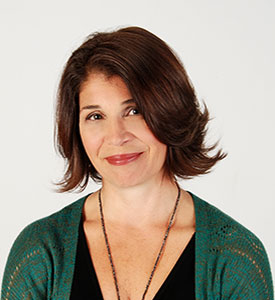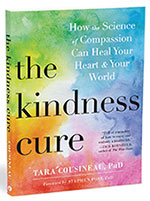 Tara Cousineau, PhD heart’s work is on cultivating kindfulness, a term she describes as capturing the intersection of mindfulness, kindness and compassion or “experiencing the present moment with heart.” She has written a book, The Kindness Cure: How the Science of Compassion Can Heal Your Heart and Your World. Her mission with the book is to educate people on the power of authentic and intentional kindness.
Tara Cousineau, PhD heart’s work is on cultivating kindfulness, a term she describes as capturing the intersection of mindfulness, kindness and compassion or “experiencing the present moment with heart.” She has written a book, The Kindness Cure: How the Science of Compassion Can Heal Your Heart and Your World. Her mission with the book is to educate people on the power of authentic and intentional kindness.
Dr. Tara’s book brilliantly intertwines stories, science-based evidence and kindness practices to help readers better understand the positive impact kindness has on our world and ourselves, as well as how to cultivate kindness in everyday life. She is a clinical psychologist and researcher by profession, a mother, and a kindness warrior.
Below is an interview with Stacey Thompson, founder of Virtues for Life, about her newly released book.
Stacey: What inspired you to write this book?
Dr. Tara: One day I found myself asking, “What happened to kindness?” It seemed the world was just falling to pieces, both in my little world raising kids and in the world at large. I am frustrated by a cool-to-be-cruel culture and passive acceptance of human indignities. This frustration turned into a motivating force. I wrote the book because I wanted to showcase everyday stories that elevate kindness as the core ingredient for wellbeing and happiness—rather than seeing kindness as sentimental, saccharine, or suspect. I wanted to share the science of kindness in a compelling and friendly way.
Stacey: You say, in your book, that kindness is a neglected virtue and that there is a cultural lack of support for kindness. Can you expand on this?
Dr. Tara: On the upside, we teach small children about kindness. There are many initiatives that spring up all over the place in preschools and kindergartens. There are special calendar days for random acts of kindness and global compassion. These initiatives are necessary, fun, beautiful, and inspiring. Then it trails off. This is the downside. Kindness also gets subsumed or co-opted by anti-bully programs, or other prevention program for risky behaviors, which are necessary of course. But, we need to nurture the good in us and not just try to stop the bad. There needs to be a balance. The research is compelling on the benefits of helping behavior and volunteering. One to two hours of helping per week prevents teens substance use. Volunteering among the elderly is better for wellbeing than an aspirin for heart health. So, putting kindness and caring front and center in everyday experiences matters. Not in a random way but intentionally. Not just for little kids but across the lifespan. We need to practice kindness repeatedly and in all areas—not just in school or churches—but in workplaces where many of us spend most of our time. We need to bring kindness into leadership.
Stacey: What are some of the benefits of cultivating kindness, both personally and for our world?
Dr. Tara: We’ve all seen the bumper sticker that says, “Kindness is contagious.” This isn’t just an endearing sentiment. This happens to be true. Researchers who study the power of social networks, online or offline, can mathematically show that any idea or behavior—negative or positive—that is inserted into a network will spread. This is the Three Degrees of Influence rule. For instance, if you demonstrate a kindness even when it is at a cost to you, that generous behavior spreads to your friend (one degree), your friend’s friend (two degrees), and your friend’s friend’s friend (three degrees)—reaching people you don’t even know. Similarly, that third-degree friend you don’t know can influence you too, just by being in a network of shared social contacts. This is just so cool. Our networks are a type of social capital. We can create caring cultures on purpose.
Stacey: You write that we all possess a compassionate instinct and that it’s part of our genetics, then what stops people from making a greater effort to be kinder?
Dr. Tara: As a therapist and researcher, I know that we are wired to care, and that empathy is part of our human blueprint. But, we must nurture it. We need to practice it. Modern science tells us that we can grow kindness and compassion from the inside out, like a habit. It’s largely a matter of where we direct our love and attention. But humans are complicated. There’s a quote from Saint Francis of Assisi that I like, “Can true humility and compassion exist in our words and eyes unless we know we too are capable of any act?” Our choices matter. Compassion widens the lens on humanity: each one of us can be cruel and kind, naughty and nice, hateful and loving, and everything in between. The contrast between suffering and joy wakes us up to life and shows us how to live in the world because, quite simply, being kind makes us feel good. We should be kind more often!
Stacey: How does stress inhibit or erode our ability to be kind?
Dr. Tara: In my opinion, chronic stress is the most significant modern-day ailment in developed countries and it’s connected to so many maladies. When you are disillusioned, afraid, or feeling threatened or unsafe, it’s hard to engage your kindness instinct. You can become exhausted, indifferent, and uncaring—all states that cause you distress. The natural response to stress is to go into a protective mode. The brain’s internal alarm system rings so loudly that your only options are Fight! Flee! Faint! Freeze! Experts explain that the stress response and its attending negative emotions narrow your focus to immediate action. You can become small-minded and mean without even realizing it, as you snap at people, become overly or undeservedly critical, and in general share your negative outlook. I call this effect Self-Protective Empathy Lethargy, or SPEL. It creeps up when we are consumed with ourselves: too busy, tired, afraid, overworked, overwhelmed, tethered to distractions like technology, or simply burned out. Basically, too consumed with coping to care.
Stacey: Many people are trying to just cope and make it through another day, never mind, intentionally doing acts of kindness. What are some simple ideas people can do throughout their day to cultivate kindness?
Dr. Tara: It’s true. Most people are overwhelmed or stressed. So, we need to learn to offset the stress response. Being kind requires the willingness to open your heart, and it also requires a conscious and sincere effort to be kinder than you already are. Even though you possess a compassionate instinct, your capacity for love and belonging can erode if you don’t exercise kindness. To offset erosion, work your way back to kindness. And it’s so worth the effort. Because shifting to a kinder attitude and purposely engaging in kind behaviors has so many benefits for wellbeing. In neuroscience, this is called “positive neuroplasticity training.” This simply means that by purposely engaging in things that are beneficial to our wellbeing can strengthen over time through practice. Just like learning to play a guitar or training for a 5k run.
There are so many ways to do this, especially once you’re aware of your stress level. One of the simplest is to ask yourself:” How can I bring kindness to this moment?” That could be for yourself or for the people in the situation. Usually it begins with taking a pause and calming down any nervous upset. This may be done by taking a walk or saying thank you. Another way is to set a daily intention to be kind to someone, especially a person you may not know well. Keep a kindness diary. Just like with tracking gratitude or blessings, keeping note of kindnesses has a cumulative effect over time. You start to feel better.
Stacey: I love the term you use in your book, “Kindness Warrior”. Please describe what a kindness warrior is and how people can become one.
Dr. Tara: A kindness warrior is a person who can put love into action. By love I mean the expansive love for humanity, not the narrow view of romantic love. It is any act of love that reflects genuine caring. Such kindheartedness is the embodiment of your feelings of warmth and generosity toward others and the world at large—and your desire to bring relief to those who are suffering. In this way, kindness is both a quality of loving presence and an orientation to life that is intentional and active. There is a quality of fierceness to kindness—like our lives depend on it (because they do).
Stacey: What if you extend kindness to someone and he or she rejects that kindness? How do you best handle this? And how do we not let that stop us from making future gestures of kindness?
Dr. Tara: It’s true that many of us feel that we’re wrung out by the world. The world asks a lot of us on a daily basis, and it’s not always so kind in return. We will always have challenging people in our lives, at home or work, in rush hour traffic. One tip is to not take things so personally. People are often having a bad day that has nothing to do with you. Another tip is to set a personal boundary, too. Self-kindness is something we also need to practice. That means being mindful of the type of people we want to connect with. I say to my teenage daughters, “Your friends can bring you up or they can bring you down. Choose wisely!”
Stacey: You write that you can use empathy to expand your awareness of and capacity for kindness. How does empathy play a role in the expression of kindness?
Dr. Tara: Empathy is a necessary starting point. We are wired for empathy and endowed with the mental capacities to harness it. The roots of empathic resonance can be seen in the emotional contagion of babies, when one laughs or cries in response to another. We experience it with a human cry, voice, movement, or facial expression. As we grow, it becomes possible to vicariously share in another’s emotional or mental states without being lost in them and mistaking them for our own. Experts talk about emotional empathy (resonating with others) and cognitive empathy (imagining yourself in another person’s place). We need both to spark motivational empathy, which is quality of empathy that motivates us to care about each other and to act kindly.
Stacey: Why do we need to cultivate courage to be a kinder person?
Dr. Tara: It’s easy to do a random act of kindness and those are lovely. Those don’t take too much effort. But being intentionally kind sometimes takes courage because we are naturally afraid of other people’s suffering, like seeing homeless people on the street or learning that a friend has cancer and not knowing what to do. Sometimes we have the expectation that our kindnesses will be reciprocated. True kindness does not have an agenda or ulterior motive. And sometimes the kindest thing one can do is knowing when to say “No.” Being kind is not being a pushover or weak. It’s standing on your own integrity and values.
Stacey: You tell rich stories in your book about how people who faced adversity did something positive that turned their life around. What is the distinguishing factor(s) that has some people do this and others not?
Dr. Tara: Human beings are very complicated. Each of us has our own histories, family conditioning, and inner resources. The thing about kindness and compassion is that they are skills: We can nurture them. We can grow kind minds. The stories I write about range from the innocence of a child wanting to help an ailing friend to a down-and-out grown up who musters the courage to ask for help; from a war veteran dealing with battle stress to a mom of a transgender child. These are ordinary human experiences with extraordinary outcomes. If there is any distinguishing factor it’s the realization that as human beings, we all belong to one another. When we dissolve differences, listen with compassion, and learn not to be afraid of another’s plight or pain, we have the ability to care for one another.
Stacey: You talk about the “Power of Pause” which allows us to “take in the entire scene” so that we can think about how to respond to something rather than react negatively. Why is this important concerning kindness?
Dr. Tara: Understanding our physiology is so important, especially the tendency to go into fight or flight mode. It’s very hard to be kind when you’re in a survival mentality. Just becoming aware of your reactivity—uncomfortable sensations, feeling and thoughts—is a key step to gaining just enough room to shift into a more mindful state of mind. A pause allows one to gain access to the compassion network in the brain. It’s moving from a high alert state in the emotional limbic center to the prefrontal cortex, the part that enables you to think in intricate ways and gain perspective. Stress and negativity can trip up the emotional alarm system and deactivate the access over a key neural network called the anterior cingulate cortex (ACC) pathway. Breathing techniques help with your ability to regulate your emotions, connect to yourself and others, read social situations, and, therefore, generate kindness and compassion. We completely underestimate the power of the breath and we carry it around every second!
Stacey: How do kindness and gratitude go hand and hand?
Dr. Tara: When people began to share their stories about kindness they also expressed gratitude, or an appreciation for the experience or the person. Both kindness and gratitude are ways of being in the world and both involve intention and action. They ignite an upswell of positive emotions and they are inherently relational. Counting acts of kindness and counting blessings are also the subject of scientific study and the overwhelming outcome is that both are good for overall wellbeing.
Stacey: What is kindfulness, a term you created and use throughout the book, and how can we bring it more into our daily lives?
Dr. Tara: I talk about “kindfulness,” which I define as being aware of the present moment with heart. It’s a word that has been around and it’s used by kindergarten teachers and Buddhist monks. I am particularly fond of the term “kindfulness” and want to see it become part of our everyday language. That’s why I emphasize it so much. As a mindfulness meditation teacher, one of the aspects I see missing in popular culture is the heart inherent in these practices. Mindfulness is not just about increased awareness, better focus, or performance. It’s so much more when you insert the heart into it. Kindfulness brings a loving spirit to mindfulness as you look at your experiences through the lens of curiosity, wonder, and appreciation. You can shift from stressed to blessed. And we could all benefit from that!
 Learn more about Dr. Tara Cousineau’s new book, The Kindness Cure by visiting her website, http://www.taracousineau.com/. Also, as part of her website, you can take a Kindness Quotient test and sign-up for her monthly newsletter and receive a free copy of Rock Your World with Kindness.
Learn more about Dr. Tara Cousineau’s new book, The Kindness Cure by visiting her website, http://www.taracousineau.com/. Also, as part of her website, you can take a Kindness Quotient test and sign-up for her monthly newsletter and receive a free copy of Rock Your World with Kindness.






Leave a Reply